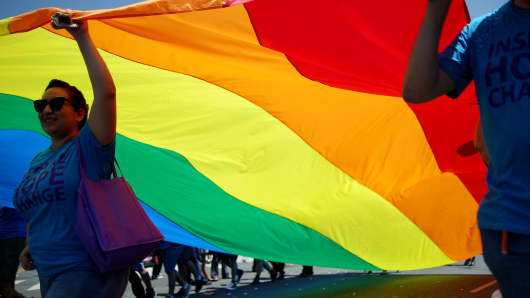If you were the general manager of a football team with the No. 1 draft pick, would you want to be able to select from among all the eligible players, or only some of them?
American companies, for most of history, were like football teams drafting from a pool of only certain eligible players. Throughout last century, corporate America took great strides to begin changing that by welcoming women and then racial and ethnic minorities into the workforce — and then ensuring they had opportunities to rise to the top. But at a lot of companies, one group — the lesbian, gay, bisexual and transgender, or LGBT, community — was still left out.
That's now changing quickly.
Read MoreSupporting LGBT: Business can't afford inequality
Fortunately, the definition of "diversity" is evolving to include people from minority sexual orientation groups alongside people who were more traditionally considered minorities in other ways. Yes, it's happening partly because many companies believe it's the right thing to do. But it's also happening because this is simply good business practice on two fronts: it attracts the widest pool of talent while also positioning the company, in the eyes of the public, as an open-minded, progressive organization that truly embraces the diverse population in the communities in which it does business.
Companies recognize that gay and lesbian employees are no different from any others: There's absolutely no correlation between sexual orientation and job performance. Some of the most skilled people in many industries are gay or lesbian, and in a competitive labor market, a smart CEO needs those people to feel comfortable working at his or her company rather than at the competition. Having a truly diverse workforce, meanwhile, makes the company better, because other employees benefit from the inclusion of a broader range of perspectives and ideas from people of different backgrounds.
There are those companies that are ahead of the curve in this regard and now benefit from being a first mover while others catch up. American Airlines houses a special page on its website dedicated to LGBT equality in the workplace. American draws attention to the fact that it is the first and only airline to have received perfect marks every year from the Human Rights Campaign (HRC) for LGBT equality in the workplace. American, in turn, attracts a larger pool of qualified applicants by offering same-sex partner health and travel benefits.
Read MoreObama bars federal discrimination against gays
JP Morgan is another example of a large corporation supporting LGBT candidates and employees. The company has a page on its website proudly discussing many opportunities such as PRIDE, its firmwide LGBT business resource group with 25 chapters around the globe.
A smaller but equally important example is technology giant Apple. After the Supreme Court repealed a major section of the Defense of Marriage Act (DOMA), the company released a statement to the public that it supports marriage equality.
And who can forget last year when Starbucks CEO Howard Schultz voiced his public support for gay marriage, after an investor in the company complained that Starbucks support of gay marriage was "eroding its bottom line." Schultz told the investor that he is free to invest in other companies.
Of course, American Airlines, JP Morgan, Apple and Starbucks aren't the only companies to have used inclusion as a way to increase applications from qualified job seekers. And other companies that have not yet embraced this trend will surely experience similar results when they do.
Big corporations that speak out against equality, meanwhile, suffer the consequences, and are quickly tagged as exhibiting bigotry, hatred and discrimination. Such was the case for Chick-fil-A CEO Dan Cathy, who publicly said gay marriage is wrong. The backlash was significant: Remember the LGBT "kiss-ins" at Chick-fil-A stores? Cathy later told the Atlanta Journal-Constitution that his anti-equality stance probably wasn't a wise business decision.
Read MoreGay CEOs urged to lead the way
Certainly, despite the LGBT movement's tremendous progress in recent years, the progress hasn't been evenly spread across all industries and all parts of the U.S. Big societal changes take time to digest. In certain regions and within certain industries, some companies are — understandably enough — treading more cautiously than others in this regard. But the world is changing quickly, and even in places where the idea of equality might remain controversial today, the companies that take bold steps to move first will someday be able to wear this as a badge of honor, when people in their regions and industries do embrace equality more broadly. Someday, Chick-fil-A's stance might be remembered in the same way companies that refused to serve African Americans are remembered today. Companies need to position themselves now to not be depicted that way later.
The LGBT community needs Corporate America to welcome it in the workplace. But American industry is increasingly realizing that it needs gay and lesbian workers and customers at least as much as they need the companies.
Steve Siebold is a mental toughness and critical thinking expert whose clients include Fortune 500 companies, entrepreneurs, professional athletes and other super achievers. He is the author of "Sex, Politics, Religion: How Delusional Thinking is Destroying America, 177 Mental Toughness Secrets of The World Class and How Rich People Think." Follow him on Twitter @Siebold.


